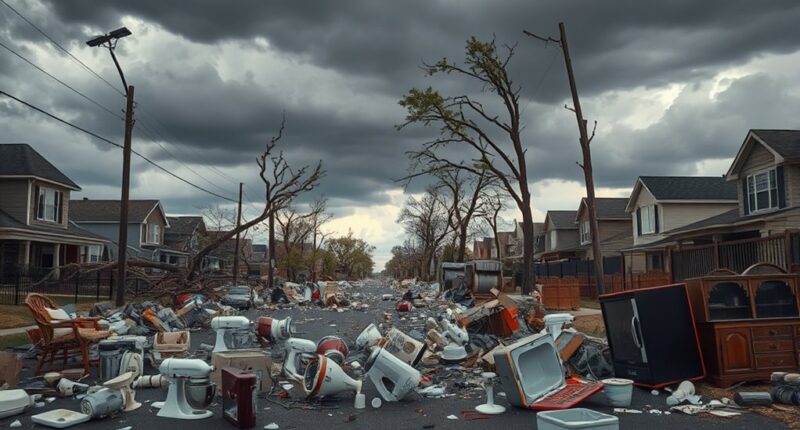After a tornado causes physical chaos, your privacy tools like mixers face new challenges. Damage to hardware and digital devices can compromise access to transaction histories and coins, raising security concerns. With regulatory scrutiny intensifying, privacy seekers must adapt by choosing more resilient and secure options. While the storm highlights vulnerabilities, it also underscores the importance of rethinking privacy strategies. To discover how your privacy can stay protected amid such upheaval, explore further insights below.
Key Takeaways
- Tornado damage may compromise physical devices used for privacy, prompting reevaluation of hardware security measures.
- Privacy mixers like Tornado.cash remain vital for anonymous transactions despite regulatory scrutiny.
- Ongoing legal pressures could restrict or ban mixer services, challenging privacy seekers’ options.
- Users may need to adopt additional security practices, such as hardware wallets and secure environments.
- The disaster highlights the importance of resilient privacy tools and adaptive strategies amid unpredictable circumstances.

When a tornado strikes, the aftermath can leave your kitchen in chaos, especially if your mixer was damaged or knocked over. The destruction isn’t just physical; it can also stir up questions about security and privacy, particularly for those who rely on privacy coins. If you’ve been using your mixer in the digital sphere—mixing transactions or laundering cryptocurrency—the storm’s disruption might make you reconsider your approach to privacy. Tornado.cash and other mixers have become popular tools for enhancing anonymity, but recent debates around cryptocurrency laundering have cast a shadow over their legitimacy. As authorities clamp down, privacy coin debates heat up, raising concerns about whether these tools are truly for privacy or facilitating illicit activities. When your digital assets are involved, you might wonder if the chaos in your physical environment mirrors the turbulence in the cryptocurrency world.
Post-tornado, you may find your digital security compromised just as your kitchen is in disarray. If your hardware wallets, computers, or other devices were damaged, your access to private transaction histories or coins could be at risk. It’s a reminder that privacy isn’t guaranteed, whether you’re protecting your financial info or your personal space. The controversy surrounding privacy coins and mixers underscores the delicate balance between privacy rights and regulatory oversight. Some argue that these tools are essential for user privacy and financial freedom, while others view them as avenues for money laundering or illegal transactions. The debates aren’t new, but the recent scrutiny intensifies the importance of understanding how these tools operate and the potential risks involved.
Additionally, recent innovations in home theatre projectors demonstrate how technology can be used both to enhance entertainment and to secure private spaces, highlighting the importance of choosing reliable and secure devices. In the upheaval of cleanup, you might also reflect on how privacy tools fit into your digital security strategy. Are you relying on mixers to keep your transactions anonymous, or has the storm revealed vulnerabilities? As authorities scrutinize cryptocurrency laundering, the future of privacy coins hangs in the balance. These coins aim to give users control over their financial privacy, but with regulations tightening, their role could shift dramatically. Whether you’re a privacy advocate or just a cautious user, the debates highlight that the landscape is evolving rapidly. The upheaval caused by natural disasters can serve as a metaphor for the upheaval in privacy norms and digital security. While your physical environment is in disarray, so too is the digital environment where privacy tools are contested and scrutinized. Staying informed and prepared is essential, especially when the world around you feels unpredictable.
Frequently Asked Questions
How Effective Are Mixers in Protecting Online Anonymity Post-Tornado?
Mixers can be quite effective in protecting your online anonymity, especially when combined with encrypted communication and anonymized browsing. They help by mixing your data with others, making it harder for anyone to trace your activity. Post-tornado, their effectiveness depends on how well you use them and other privacy tools. While they don’t guarantee complete anonymity, they markedly reduce the risk of being tracked or identified online.
Are There New Privacy Tools Emerging After Tornado-Related Disruptions?
You’re curious if new privacy tools are emerging after tornado-related disruptions. Yes, some innovations focus on cryptocurrency privacy and digital footprint reduction, helping you stay anonymous online. These tools include enhanced privacy coins and advanced encryption methods, making it harder for others to track your activity. As disruptions challenge traditional methods, these emerging solutions aim to give you better control over your online privacy, even amid chaos.
Can Mixers Be Legally Used in All Jurisdictions After a Tornado?
You should know that using mixers legally depends on your jurisdiction, as legal compliance varies widely. After a tornado, jurisdictional challenges can complicate enforcement, but it’s risky to assume mixers are legal everywhere. Always research local laws before using a mixer, because what’s permitted in one area might be illegal elsewhere. Stay informed, and don’t ignore the legal landscape to avoid potential penalties or legal issues.
What Are the Risks of Using Mixers During Widespread Network Outages?
Using mixers during widespread network outages poses significant cryptocurrency risks, like loss of funds or exposure of your digital footprint. Outages can disrupt transaction processing, increasing the chance of errors or security breaches. Plus, if you rely on mixers to protect privacy, interruptions might force you to reveal more personal info or leave traces that compromise your anonymity. Stay cautious, and remember that network stability is essential for maintaining your crypto privacy.
How Do Privacy Seekers Adapt Their Strategies After Tornado-Induced Infrastructure Damage?
After a tornado damages infrastructure, you adapt your privacy strategies by focusing on community resilience and digital security. You might use offline tools like encrypted USBs or local networks to protect your data. Staying connected with trusted groups helps maintain privacy, while avoiding reliance on vulnerable internet services. By being resourceful and cautious, you make certain your digital security remains intact despite the chaos, leveraging community support and alternative methods.
Conclusion
After the tornado, privacy seekers face a challenging landscape. With many mixers damaged or destroyed, your options become limited, and vulnerabilities increase. However, staying informed and adapting your strategies can help protect your privacy. Remember, even in the aftermath, you have the power to take control. By being cautious and proactive, you can minimize risks and rebuild your privacy defenses, ensuring you’re prepared for whatever comes next. Keep vigilant and stay safe.








